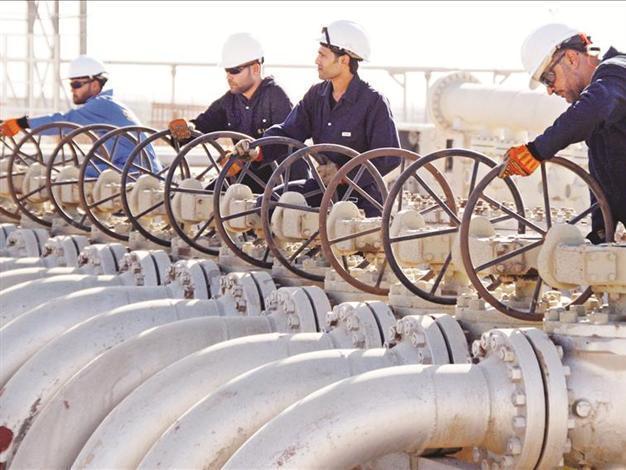Iraq oil sales dip last month but income up in 2012
BAGHDAD - Agence France-Presse

Workers adjust the valves of oil pipes at West Qurna oilfield in Iraq’s southern province of Basra in this file photo. The country, whose economy is higly dependent on oil, announces the fall of oil exports in 2012 and discovery of one billion barrels of oil equivalent crude at south on consecutive days. REUTERS photo
Iraq’s oil exports in December fell due to bad weather and a dispute with the northern Iraqi regional government, but the country still saw sharply higher income last year compared to 2011, new figures showed yesterday, the day followed the country announced disvovery of billion barrels of oil.Sales of crude and revenues from oil exports last month were both the lowest figures since June, a statement from Iraq’s oil ministry said, with average daily exports of 2.35 million barrels per day (bpd). The average price per barrel was $103.72, according to the ministry.
The statement showed that Iraq nevertheless brought in $94.03 billion in oil revenues over the course of 2012, a 13 percent increase compared to the previous year, largely on the back of ever-increasing exports.
Crude exports account for the lion’s share of government income, and Baghdad is looking to dramatically ramp up both production and sales in the coming years, bringing in much-needed cash to rebuild its conflict-battered economy.
“It was because of bad weather, which affected the level of exports, and also because of the cut in oil exports from Northern Iraq,” said ministry spokesman Assem Jihad, explaining the December decline.
He was referring to a decision by the northern Kurdish region to slash oil exports from over 100,000 bpd in recent months to fewer than 5,000 bpd over a payments row with Baghdad.
Baghdad and Arbil are at odds over issues including regional government’s refusal to seek approval from the central government for oil contracts it has awarded to foreign firms, and over a swathe of disputed territory in northern Iraq.
The central government says all oil deals must go through the national oil ministry and regards any that do not as illegal.
The country has proven reserves of 143.1 billion barrels of oil and 3.2 trillion cubic metres (111.9 trillion cubic feet) of gas, both of which are among the largest in the world.
Meanwhile, Iraq said on Jan.20 it has discovered deposits of crude equivalent to one billion barrels of oil after the first exploration work by state-owned firms in almost 30 years.
The deposits were found after exploration in Maysan province, in southern Iraq near the border with Iran, and could potentially make a significant addition to Baghdad’s already substantial reserves.
“Exploration began in Maysan, south of (provincial capital) Amara” last year, oil ministry spokesman Assem Jihad told AFP.
“Today, it completed 100 percent and achieved a big success.
“The initial assessment from this discovery is about one billion barrels of oil,” he said, adding: “It will increase production capacity for (state-owned) Maysan Oil Company.” Jihad said the state-owned oil exploration firm had been carrying out its first exploration work within Iraq in nearly three decades.
Iraq, which is highly dependent on oil sales for government revenue, has sought in recent years to dramatically ramp up production and exploration in order to help rebuild its conflict-battered economy. and infrastructure.
















